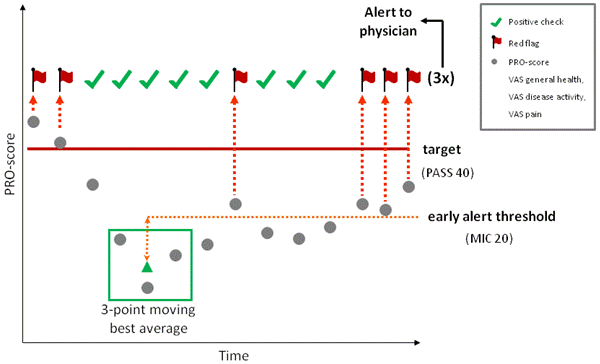Session Information
Title: Health Services Research, Quality Measures and Quality of Care - Innovations in Health Care Delivery
Session Type: Abstract Submissions (ACR)
Background/Purpose: Several Patient Reported Outcome (PRO)-based instruments to measure disease activity in Rheumatoid Arthritis (RA) exist, though an evidence base for their use in monitoring strategies is lacking. The objective of this study was to evaluate alerts generated by a PRO-based algorithm for monitoring patients with RA in the second year follow-up after diagnosis.
Methods: The algorithm (figure 1) monitors an easily attainable, equally weighted PRO-score of VAS general health, VAS disease activity and VAS pain. Red flags are generated in two instances:
1. the target level of disease activity is not met (set at a Patient Acceptable Symptom State value of 40mm)
2. change in disease activity (current level versus best moving average of 3 past visits) surpasses the early alert threshold (set at a Minimal Important Change value of 20mm)
Three consecutive red flags trigger an alert to the physician.
Data from patients with complete second year follow-up, included consecutively in the Nijmegen Early RA cohort between 2003-2011, were used. Weekly PRO-scores were interpolated, with addition of a random error component, based on the empirical individual patient data during the second year follow-up after diagnosis. Alerts were evaluated against DMARD/Biologic medication escalation registered in daily clinical practice. Escalation was defined as an increase in dose/frequency or start of new drug. Analyses were stratified according to DAS28 level at 12 months.
Figure 1. Preliminary PRO-based algorithm
Results: Data of 158 patients with RA were available for analysis. An overview of the algorithm performance is shown in table 1. The Negative Predictive Values (NPVs) represent the proportion of visits without medication escalation in all cases that the algorithm did not generate an alert. Overall, in 92.5% of visits where the algorithm did not generate an alert medication was also not escalated.
Table 1. preliminary algorithm results
|
Visits |
PPV |
NPV |
Sens |
Spec |
A priori chance of escalation |
|
|
Total |
693 |
14.0 |
92.5 |
55.7 |
61.5 |
10.1 |
|
Stratified according to DAS2812 months |
||||||
|
DAS28 <2.6 |
277 |
6.0 |
95.9 |
38.5 |
70.5 |
4.7 |
|
DAS28 <=3.2 &>=2.6 |
101 |
16.7 |
95.4 |
66.7 |
67.4 |
8.9 |
|
DAS28 <5.1 & >3.2 |
282 |
18.3 |
86.8 |
54.5 |
55.0 |
15.6 |
|
DAS28 >=5.1 |
33 |
13.8 |
100 |
100 |
13.8 |
12.1 |
PPV: Positive Predictive Value, NPV: Negative Predictive Value, Sens: Sensitivity, Spec: Specificity
Conclusion: The high NPVs indicate that, when using the algorithm, the chance of missing patients in need of medication escalation is very low. These findings provide evidence that an off-site monitoring system could aid in optimizing the number and timing of face-to-face consultations of patients with their rheumatologists. Further investigation into the optimal PRO-score, measurement frequency and algorithm parameter values to be used for off-site monitoring is warranted.
Disclosure:
J. Hendrikx,
Pfizer Inc,
2;
J. Fransen,
Pfizer Inc,
2;
A. Toniolo,
Pfizer Inc,
3;
P. L. C. M. van Riel,
Pfizer Inc,
2.
« Back to 2013 ACR/ARHP Annual Meeting
ACR Meeting Abstracts - https://acrabstracts.org/abstract/moving-towards-personalized-healthcare-a-patient-reported-outcome-based-algorithm-can-aid-rheumatologists-and-patients-in-monitoring-rheumatoid-arthritis-in-daily-clinical-practice/

